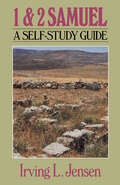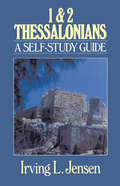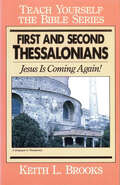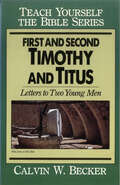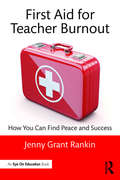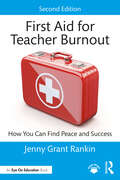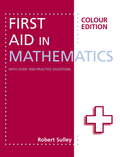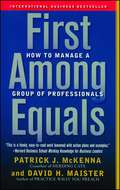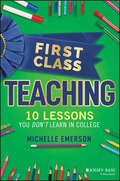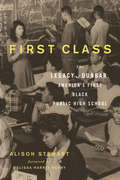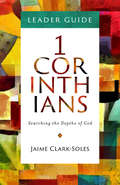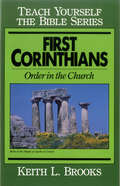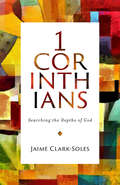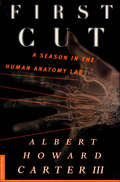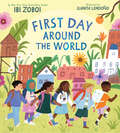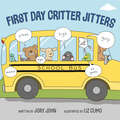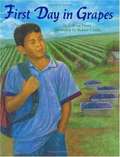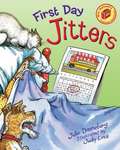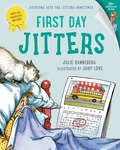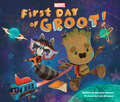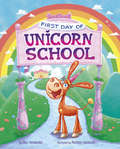- Table View
- List View
First & Second Samuel- Jensen Bible Self Study Guide (Jensen Bible Self-Study Guide Series)
by Irving L. JensenSamuel, the last of the judges, wrote his first book linking the judges and the monarchy. In it he called the people to a revival of the true worship of Yahweh (the Lord). He was also chosen by God to anoint both Saul and David as kings of Israel.The books in the Jensen Bible Self-Study Guide series are designed to provide you with a broader understanding of God&’s Word. Offering historical context and background, author information, charts, and other helps, these books will equip you with a comprehensive reference tool you&’ll return to often. Each study includes an opportunity for analysis, response, and further study in a response-oriented format. The thirty-nine books in this series are suitable for both personal and group use.
First & Second Thessalonians- Jensen Bible Self Study Guide (Jensen Bible Self-Study Guide Series)
by Irving L. JensenAlthough the apostle Paul was in Thessalonica only a short time, his teachings had an enormous effect on the young believers living there. His first letter was both a reminder of what he had taught them and a call for each believer to be prepared for the imminent return of Christ. In his second letter you will see how Paul handled misunderstanding and anxiety regarding the Day of the Lord. This Self-Study Guide will be an indispensable aid as you study Paul's letters to the Thessalonians.The books in the Jensen Bible Self-Study Guide series are designed to provide you with a broader understanding of God&’s Word. Offering historical context and background, author information, charts, and other helps, these books will equip you with a comprehensive reference tool you&’ll return to often. Each study includes an opportunity for analysis, response, and further study in a response-oriented format. The thirty-nine books in this series are suitable for both personal and group use.
First & Second Thessalonians- Jensen Bible Self Study Guide (Jensen Bible Self-Study Guide Series)
by Irving L. JensenAlthough the apostle Paul was in Thessalonica only a short time, his teachings had an enormous effect on the young believers living there. His first letter was both a reminder of what he had taught them and a call for each believer to be prepared for the imminent return of Christ. In his second letter you will see how Paul handled misunderstanding and anxiety regarding the Day of the Lord. This Self-Study Guide will be an indispensable aid as you study Paul's letters to the Thessalonians.The books in the Jensen Bible Self-Study Guide series are designed to provide you with a broader understanding of God&’s Word. Offering historical context and background, author information, charts, and other helps, these books will equip you with a comprehensive reference tool you&’ll return to often. Each study includes an opportunity for analysis, response, and further study in a response-oriented format. The thirty-nine books in this series are suitable for both personal and group use.
First & Second Thessalonians-Teach Yourself the Bible Series (Teach Yourself the Bible)
by Keith BrooksThe Teach Yourself the Bible Series is one of the best New Testament studies you will find anywhere. Each book in the series is packed full of valuable questions on individual chapters of the Bible, check-ups to test your grasp of scriptural truths, and usable suggestions for group study.Grow in your knowledge of God through each New Testament book, then go on to study six aspects of Christianity essential for all believers: doctrine, prayer, eternal life, prophecy, Christian character, and Bible study.Paul wrote his Thessalonian epistles for four reasons: (1) to confirm young believers in the faith; (2) to encourage them toward victory in the face of persecution; (3) to correct doctrinal errors; (4) to teach them what God has revealed concerning the Lord's return. Study for yourself these two letters still pertinent for believers today.Strengthen your relationship with the living God with all twenty-five books of the Teach Yourself the Bible Series. Each volume is a timeless, yet practical, study of the Word of God.
First & Second Timothy & Titus-Teach Yourself the Bible Series (Teach Yourself the Bible)
by Calvin BeckerThe Teach Yourself the Bible Series is one of the best New Testament studies you will find anywhere. Each book in the series is packed full of valuable questions on individual chapters of the Bible, check-ups to test your grasp of scriptural truths, and usable suggestions for group study.Grow in your knowledge of God through each New Testament book, then go on to study six aspects of Christianity essential for all believers: doctrine, prayer, eternal life, prophecy, Christian character, and Bible study.Paul wrote to the young men Timothy and Titus three letters called the pastoral epistles. His earnest love and advice for each man encourages us today, not only in our ministry, but in our personal lives.Strengthen your relationship with the living God with all twenty-five books of the Teach Yourself the Bible Series. Each volume is a timeless, yet practical, study of the Word of God.
First Aid for Teacher Burnout: How You Can Find Peace and Success
by Jenny Grant RankinOffering clear strategies rooted in research and expert recommendations, First Aid for Teacher Burnout empowers teachers to prevent and recover from burnout while finding success at work. Each chapter explores a different common cause of teacher burnout and provides takeaway strategies and realistic tips. Chapter coverage includes fighting low morale, diminishing stress, streamlining grading, reducing workload, leveraging collaboration, avoiding monotony, using technology to your advantage, managing classroom behavior, advocating for support from your administration, securing the help of parents and community, and more. Full of reflection exercises, confessions from real teachers, and veteran teacher tips, this accessible book provides easy-to-implement steps for alleviating burnout problems so you can enjoy peace and success in your teaching.
First Aid for Teacher Burnout: How You Can Find Peace and Success
by Jenny Grant RankinOffering clear strategies rooted in research and expert recommendations, the new edition of First Aid for Teacher Burnout empowers teachers to prevent and recover from burnout while finding success at work in a sustainable way. Each chapter explores a different common cause of teacher burnout and provides takeaway strategies and realistic tips. Chapter coverage includes fighting low morale, diminishing stress, streamlining grading, reducing workload, leveraging collaboration, using technology to your advantage, managing classroom behavior, advocating for support from your administration, securing the help of parents and community, and more. New in this edition, the author expands on discussion about teacher activism, using digital resources, as well as a wealth of tips throughout for those teaching virtually. Full of reflection exercises, confessions from real teachers, and veteran teacher tips, this accessible book provides easy-to-implement steps for alleviating burnout problems so you can enjoy peace and success in your teaching.
First Aid in Mathematics Colour Edition
by Robert SulleyAchieve the best possible standard with this bestselling book of traditional practice and guidance - now in colour! First Aid in Mathematics provides all the help and support needed for learning and practising Mathematics. It offers comprehensive coverage of core mathematical topics in clear and accessible language. It is suitable for both native English speakers and students of English as a second language and can be used in class, or as a reference and revision book. - Develops a strong basis of understanding with core topics covered in clear and accessible language - Improves student's ability to work through problems with plenty of practice exercises and revision tests - Reflects its international readership with terms and information that are appropriate for students worldwide
First Aid in Mathematics Colour Edition
by Robert SulleyAchieve the best possible standard with this bestselling book of practice and guidance - now in colour First Aid in Mathematics is written in clear and concise language to provide all the help, support and practice needed to master the key topics in basic mathematics. The book contains over 1,000 carefully planned practice questions to help readers reinforce their knowledge. Revision tests are provided at the end of each chapter. First Aid in Mathematics is ideal for use in the classroom or as a reference and revision book for those wanting to improve their mathematical skills.
First Among Equals: How to Manage a Group of Professionals
by David H. Maister Patrick J. McKennaProfessional service gurus David Maister and Patrick McKenna have created a practical handbook on how to lead professional colleagues or peers when you lack formal authority. Harvard Business School’s Working Knowledge calls it “a timely, easy to read work leavened with action plans and examples.”Whether you have recently been appointed as a group leader or are a battle-scarred veteran, you know that managing professional people is difficult! In this unique handbook, Patrick J. McKenna and David H. Maister argue that leaders will best enable their people to achieve peak performance not by managing them, not by leading them, but by inspiring them. The authors show you how to actually add value as a group leader or induce people to accept your guidance, even with intelligent professionals who are often free-agents accustomed to having automony to work on grueling assignments with little supervision. They also give advice on how to handle those oh-so-talented but oh-so-annoying professionals who exhibit attitude problems or are just exceedingly difficult to work with, when you need them but they tend to needle you. The lessons and learning presented here will give you insights and action tips to help you provoke and inspire your people to their full potential.
First Art for Toddlers and Twos: Open-Ended Art Experiences
by Maryann KohlDiscover the natural curiosity and enthusiasm of toddlers and twos as they explore creative art experiences designed just for them. In this updated, color edition of First Art for Toddlers and Twos, you will find more than seventy-five art experiences, with lots of variations that add to the fun and tips for making the activities run smoothly. First Art for Toddlers and Twos starts children on a journey full of exploration and creativity!
First Class Teaching: 10 Lessons You Don't Learn in College
by Michelle EmersonThe go-to book for new teachers who need practical strategies, not textbook theory Are you a new teacher preparing to transition from college to the real-world classroom? First Class Teaching: 10 Lessons You Don't Learn in College will help you dodge the struggle and burnout that many new teachers face. Let’s be real—many of the strategies you learned in school are unrealistic and ineffective in a classroom. When faced with this challenge, what do you do instead? Pick up this book to bridge the gap and familiarize yourself with ways to prepare for stepping foot into the classroom. You’ll find relatable stories that will make you feel less alone and equip you with simple and effective strategies that you can implement immediately to make your first few teaching years a whole lot easier. When you read First Class Teaching, you’ll feel like you’re connecting with a “teacher best friend.” Skip the cliched advice and discover how you can ignite your enthusiasm for the classroom, , get students engaged, build relationships, deal with a lack of planning time, and more. Read relatable stories of real-life teacher who overcame burnout, poor student behaviors, difficult administration, and more. Learn strategies that you can implement right away to overcome the difficulties that often lead new teachers to burnout. Get excited about teaching with motivational insights and advice that’s more what is learned in college courses. Hit the ground running as a new teacher, thanks to these tried-and-true tips from experienced educatorWhether you’re overwhelmed as a recent college graduate in your first K-12 teaching job or a veteran K-12 teacher looking to rediscover your passion for the profession, First Class Teaching will give you novel ideas and strategies to implement in your .
First Class: The Legacy of Dunbar, America’s First Black Public High School
by Alison Stewart Melissa Harris-PerryCombining a fascinating history of the first U.S. high school for African Americans with an unflinching analysis of urban public-school education today, First Class explores an underrepresented and largely unknown aspect of black history while opening a discussion on what it takes to make a public school successful. In 1870, in the wake of the Civil War, citizens of Washington, DC, opened the Preparatory High School for Colored Youth, the first black public high school in the United States; it would later be renamed Dunbar High and would flourish despite Jim Crow laws and segregation. Dunbar attracted an extraordinary faculty: its early principal was the first black graduate of Harvard, and at a time it had seven teachers with PhDs, a medical doctor, and a lawyer. During the school's first 80 years, these teachers would develop generations of highly educated, successful African Americans, and at its height in the 1940s and '50s, Dunbar High School sent 80 percent of its students to college. Today, as in too many failing urban public schools, the majority of Dunbar students are barely proficient in reading and math. Journalist and author Alison Stewart--whose parents were both Dunbar graduates--tells the story of the school's rise, fall, and possible resurgence as it looks to reopen its new, state-of-the-art campus in the fall of 2013.
First Corinthians Leader Guide: Searching the Depths of God (1 Corinthians)
by Jaime Clark-Soles1 Corinthians is one of the most gripping books in the Bible. In this letter, Paul, the complicated, layered apostle, writes to the people trying a wild new social experiment known as a Christian community. Not unlike the church today, this community dealt with factions, sexual immorality, gender issues, money issues, theological questions, lawsuits, problems in worship, and problems in leadership.In 1 Corinthians: Searching the Depths of God, Jaime Clark-Soles explores these topics and the awe inspiring, breathtaking world of the first-century church. Examining the teachings of Paul, she addresses church history, the logic of the cross, spiritual gifts, death, afterlife and the resurrection, human sexuality, and the joys and challenges of living in community. Participants will learn to look at 1 Corinthians from a variety of viewpoints and apply its lessons to their own faith.The Leader Guide contains everything needed to guide a group through the six-week study including session plans, activities, and discussion questions, as well as multiple format options.
First Corinthians-Teach Yourself the Bible Series: Order in the Church (Teach Yourself the Bible)
by Keith L. BrooksThe Teach Yourself the Bible Series is one of the best New Testament studies you will find anywhere. Each book in the series is packed full of valuable questions on individual chapters of the Bible, check-ups to test your grasp of scriptural truths, and usable suggestions for group study.Grow in your knowledge of God through each New Testament book, then go on to study six aspects of Christianity essential for all believers: doctrine, prayer, eternal life, prophecy, Christian character, and Bible study.The Corinthian church was predominately Gentile, its members both rich and poor, educated and ignorant. Loose habits of paganism clung to many. Paul in 1 Corinthians appeals to them to remember their high position in Christ and the reality of their union with Him. His exhortation to bring their spiritual state into conformity with their standing in Christ is relevant to all generations.Strengthen your relationship with the living God with all twenty-five books of the Teach Yourself the Bible Series. Each volume is a timeless, yet practical, study of the Word of God.
First Corinthians: Searching the Depths of God (1 Corinthians)
by Jaime Clark-Soles1 Corinthians is one of the most gripping books in the Bible. In this letter, Paul, the complicated, layered apostle, writes to the people trying a wild new social experiment known as a Christian community. Not unlike the church today, this community dealt with factions, sexual immorality, gender issues, money issues, theological questions, lawsuits, problems in worship, and problems in leadership.In 1 Corinthians: Searching the Depths of God, Jaime Clark-Soles explores these topics and the awe inspiring, breathtaking world of the first-century church. Examining the teachings of Paul, she addresses church history, the logic of the cross, spiritual gifts, death, afterlife and the resurrection, human sexuality, and the joys and challenges of living in community. Participants will learn to look at 1 Corinthians from a variety of viewpoints and apply its lessons to their own faith.Additional components for a six-week study include a DVD featuring Jaime Clark-Soles and a comprehensive Leader Guide.
First Cut: A Season in the Human Anatomy Lab
by Albert Howard Carter IIIWith humor, compassion, and wisdom, Howard Carter recounts the semester he spent watching first-year medical students in a human anatomy lab. From the tentative early incisions of the back, the symbolic weight of extracting the heart, and by the end, the curious mappings of the brain, we embark on a path that is at once frightening, awesome, and finally redemptive.
First Day Around the World
by Ibi ZoboiFrom award-winning, New York Times bestselling author Ibi Zoboi and artist Juanita Londoño, this lyrical celebration of the first day of school across every continent explores what going back to school looks like for children in countries around the world!How do children around the world spend their first day of school?Some eat warm akara for breakfast in Nigeria, while others unwrap lunches of kluski in Poland. In China, they practice intricate characters in special notebooks, and in Argentina, they learn each other's names in a sing-song memory game. No matter where in the world, every student has something new to look forward to on their first day!From Ethiopia to Germany to India to Brazil, this lyrical text introduces young readers to the breakfast-to-bedtime routines, cultures, and landscapes that connect people across all continents.
First Day Critter Jitters
by Jory JohnFirst-day-of-school jitters have never been funnier or more reassuring than in this picture book by the New York Times bestselling author Jory John and critically acclaimed illustrator Liz ClimoIt's almost the first day of school, and the animals are nervous. Sloth worries about getting there on time, snake can't seem to get his backpack fastened onto his body, and bunny is afraid she'll want to hop around instead of sitting still. When they all arrive at their classroom, though, they're in for a surprise: Somebody else is nervous too. It's their teacher, the armadillo! He has rolled in as a ball, and it takes him a while to relax and unfurl. But by the next day, the animals have all figured out how to help one another through their jitters. School isn't so scary after all.
First Day In Grapes
by Robert Casilla L. King Pérez<P>Chico's family moves up and down the state of California all year to pick fruits and vegetables, so each September, Chico starts at a new school. Often, the other kids pick on him. <P>But third grade promises to be different. His teacher recognizes his excellent abilities in math--he may even get to go to the math fair. When some fourth-grade bullies tease him, he surprises them with strengths of his own.
First Day Jitters
by Julie DannebergEveryone knows that sinking feeling in the pit of the stomach just before diving into a new situation. Sarah Jane Hartwell is scared and doesn't want to start over at a new school. She doesn't know anybody, and nobody knows her. It will be awful. She just knows it. With much prodding from Mr. Hartwell, Sarah Jane reluctantly pulls herself together and goes to school. She is quickly befriended by Mrs. Burton, who helps smooth her jittery transition. This charming and familiar story will delight readers with its surprise ending. FIRST DAY JITTERS is an enchanting story that is sure to be treasured by anyone who has ever anticipated a first day of school.
First Day Jitters (The Jitters Series #1)
by Julie DannebergEveryone knows that sinking feeling in the pit of the stomach just before diving into a new situation. Sarah Jane Hartwell is scared and doesn't want to start over at a new school. She doesn't know anybody, and nobody knows her. It will be awful. She just knows it. With much prodding from Mr. Hartwell, Sarah Jane reluctantly pulls herself together and goes to school. She is quickly befriended by Mrs. Burton, who helps smooth her jittery transition. This charming and familiar story will delight readers with its surprise ending.Fun, energetic illustrations brighten page after page with the busy antics surrounding Sarah Jane. FIRST DAY JITTERS is an enchanting story that is sure to be treasured by anyone who has ever anticipated a first day of school.
First Day of Groot!
by Brendan DeneenYou'll find adventure at every turn. Now, come on, quick—it's time to learn! Just like the rest of us, Groot's learning that there's a first time (and a first day!) for everything. Follow Rocket and Groot as they set off across the galaxy learning new lessons, developing new skills, and making new memories with friends along the way. With so many new experiences on the horizon, Groot's sure to have a first day rooted in spectacular fun, heroics, and everything in between. Don't be late for this thrilling adventure with the mightiest heroes from Earth and beyond! Told in rhyme and accompanied by colorful and action-packed illustrations, First Day of Groot! is the perfect story to help little learners get excited about first-time experiences.
First Day of Unicorn School
by Jess (Fink) HernandezMilly is incredibly excited to go to Unicorn School, a school that accepts only the best and the brightest. There’s only one problem: she isn’t a unicorn! She’s a donkey in a party hat. Milly first feels uncomfortable but eventually learns that she and the others at the school have more in common than it might have seemed.
First Day on a Strange New Planet
by Dan YaccarinoA boy from Earth and an alien boy from Meep participate in the Galactic Space Exchange Program.
